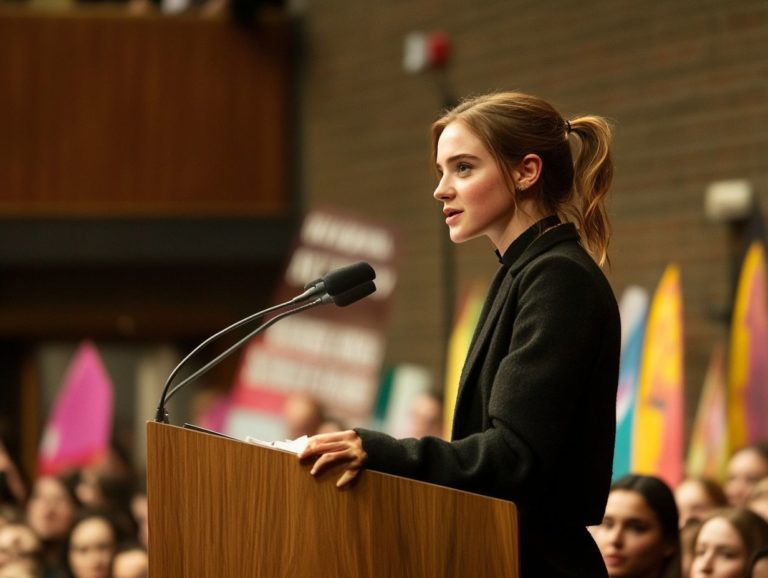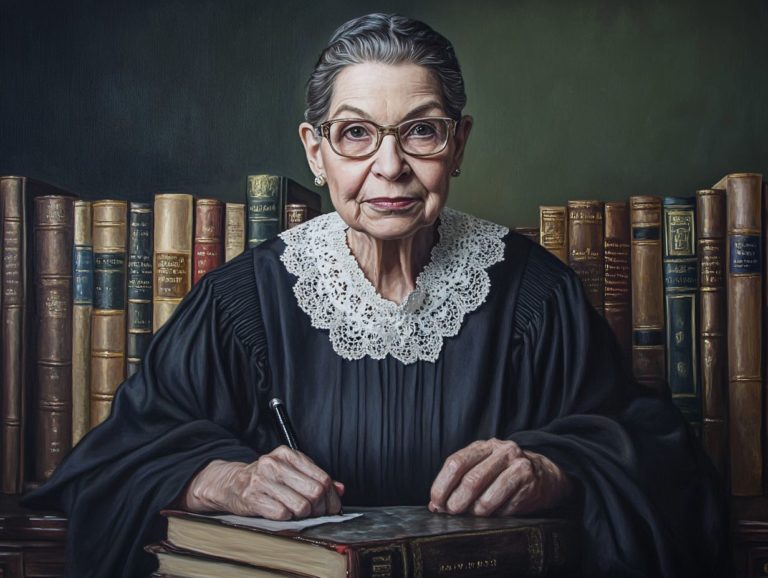5 Inspiring Leaders of the Civil Rights Movement
Martin Luther King Jr. is recognized as the most prominent figure of the civil rights movement. He guided African Americans and their allies toward achieving racial equality through nonviolent protest and grassroots activism.
His eloquence and commitment to social justice galvanized a nation. He inspired countless individuals to join the fight against widespread racism and discrimination.
Born on January 15, 1929, in Atlanta, Georgia, King was shaped by his religious upbringing and the injustices he faced. From an early age, he understood the importance of equality and fairness, influenced by his father s role as a pastor and civil rights advocate.
King s leadership during key events like the Montgomery Bus Boycott challenged racial segregation in public transport. His iconic “I Have a Dream” speech at the March on Washington established his transformative reputation.
King s dream resonated deeply across the nation. It reminds us and future generations of the power of peaceful resistance in the pursuit of equality.
Contents
- Key Takeaways:
- 2. Rosa Parks – The Mother of the Civil Rights Movement
- 3. Malcolm X – The Controversial Figure in the Civil Rights Movement
- 4. Thurgood Marshall – The First African American Supreme Court Justice
- 5. Medgar Evers – The Civil Rights Activist Who Paid the Ultimate Price
- How Did the Civil Rights Movement Begin?
- Frequently Asked Questions
- Who were the 5 inspiring leaders of the Civil Rights Movement?
- What impact did Martin Luther King Jr. have on the Civil Rights Movement?
- What role did Rosa Parks play in the Civil Rights Movement?
- Why is Malcolm X considered an inspiring leader of the Civil Rights Movement?
- How did Thurgood Marshall contribute to the Civil Rights Movement?
- What was the impact of Ella Baker on the Civil Rights Movement?
Key Takeaways:
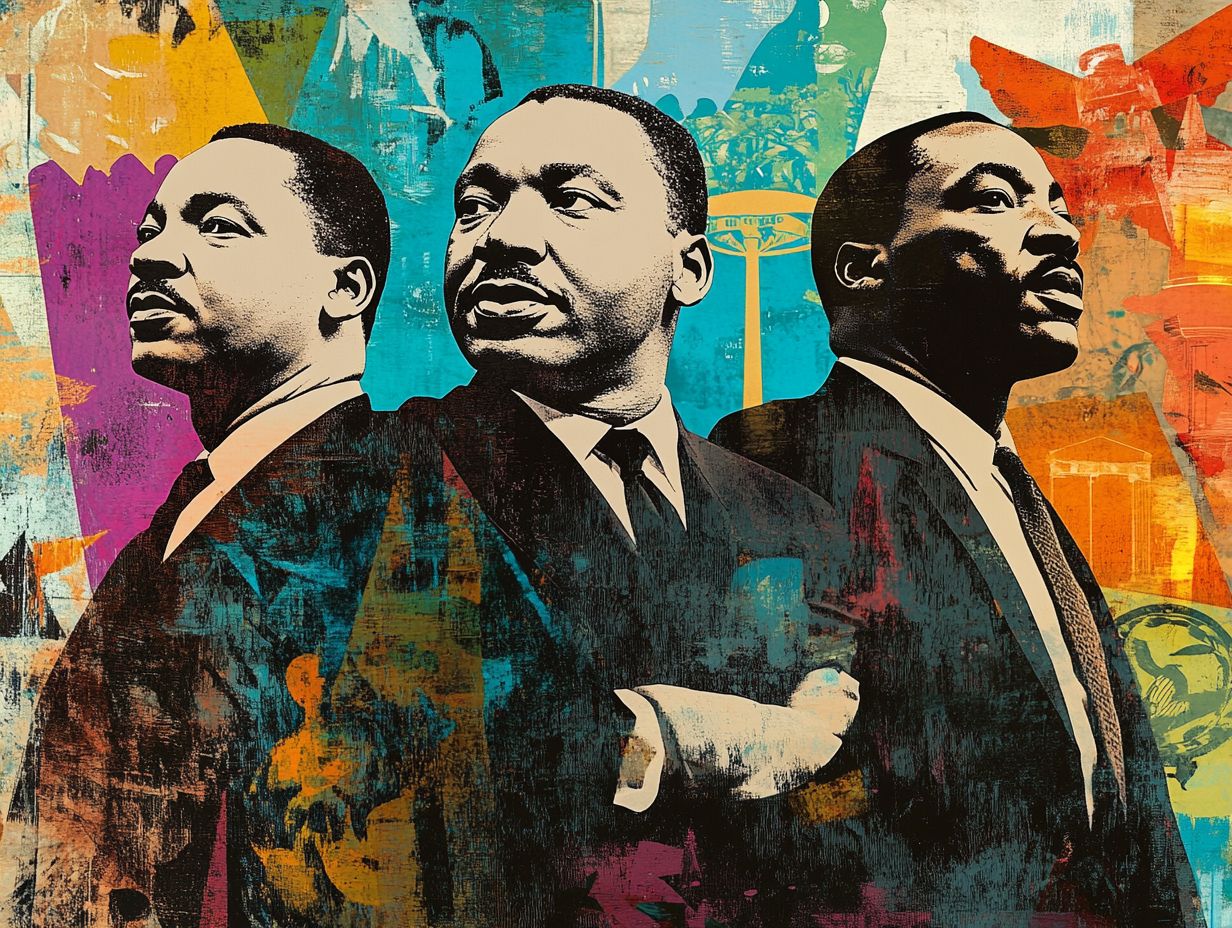
- Martin Luther King Jr.’s peaceful leadership united people of all races in the fight for civil rights.
- Rosa Parks’ brave act of defiance sparked a movement that led to major changes in segregation laws.
- Malcolm X’s strong voice challenged the status quo and pushed for radical change in the civil rights movement.
2. Rosa Parks – The Mother of the Civil Rights Movement
Rosa Parks is often hailed as the Mother of the Civil Rights Movement because of her fearless act of civil disobedience when she refused to surrender her bus seat to a white passenger. Her brave act sparked the Montgomery Bus Boycott and launched a nationwide struggle against segregation and racial injustice.
Born in Tuskegee, Alabama, Parks grew up in a world steeped in discrimination and inequality. From an early age, her unwavering commitment to civil rights shone through as she got involved with the National Association for the Advancement of Colored People (NAACP), collaborating with prominent leaders like Martin Luther King Jr. and E.D. Nixon.
On that fateful December day in 1955, she didn t just take a stand she set in motion a pivotal movement that encouraged countless individuals to raise their voices against injustice. Her courage continues to inspire generations, proving that one person s actions can echo through history and play a fundamental role in the fight for social equality.
3. Malcolm X – The Controversial Figure in the Civil Rights Movement
Malcolm X stands out as one of the most provocative figures in the civil rights movement. He fervently advocated for Black nationalism and the human rights of African Americans. He delivered a powerful critique of systemic racism and championed self-determination, asserting that genuine freedom demands more than mere passive resistance.
Born Malcolm Little in 1925, his early life was shaped by the brutal realities of racial violence. This backdrop ignited his later activism. With a history marked by his father’s murder and his mother’s institutionalization, he initially veered into a life of crime. However, during his prison time, he underwent a remarkable transformation, embracing the teachings of the Nation of Islam.
While Martin Luther King Jr. championed nonviolent resistance, Malcolm X highlighted the importance of self-defense and the necessity of confronting oppression head-on. His speeches, particularly The Ballot or the Bullet, resonated deeply with those frustrated by the sluggish pace of change. This positioned him as a crucial figure in the advancement of racial justice.
Even after his assassination in 1965, his legacy remains a source of inspiration for activists dedicated to the pursuit of equity and justice in America.
4. Thurgood Marshall – The First African American Supreme Court Justice
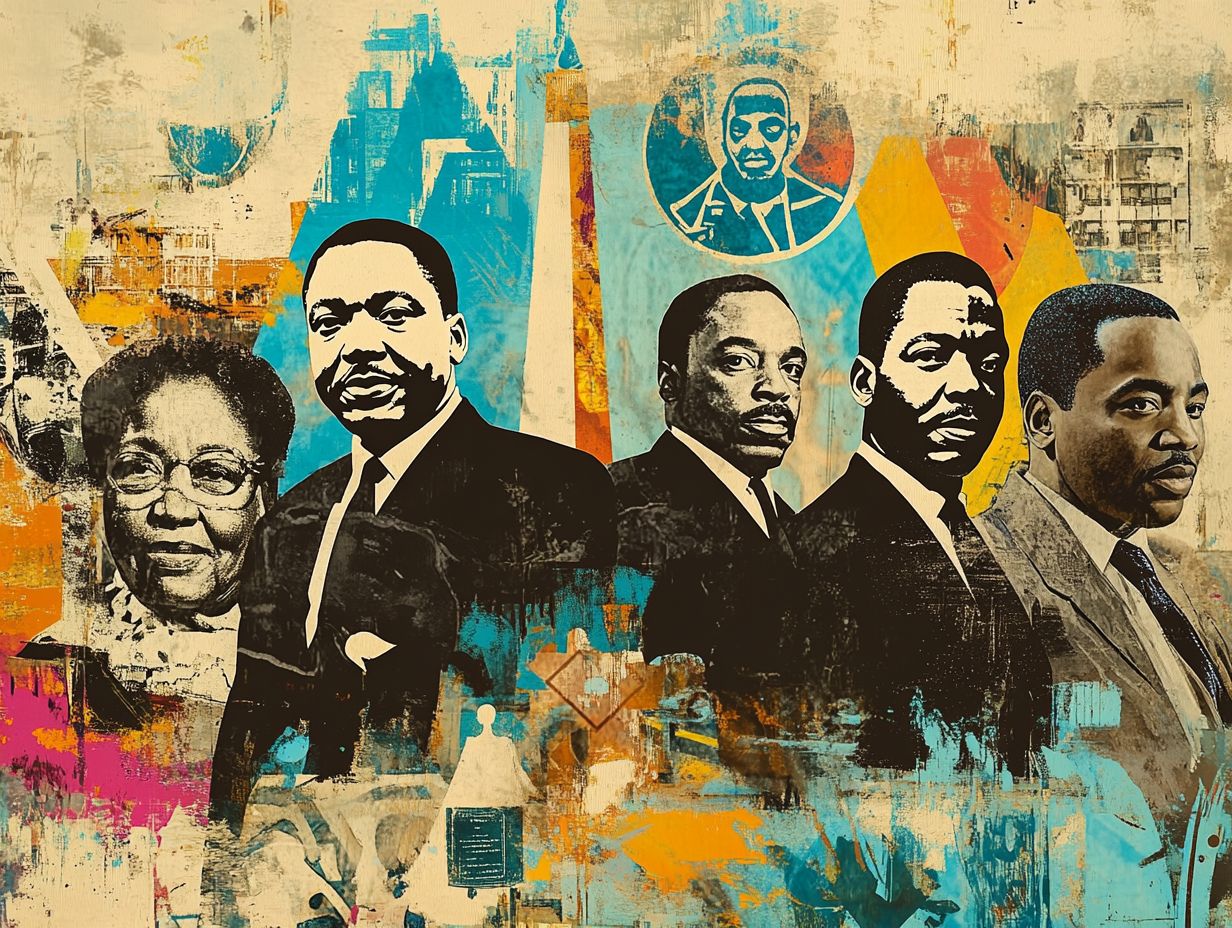
Thurgood Marshall, the first African American Supreme Court Justice, played a pivotal role in the civil rights movement through his legal support. He tirelessly battled against discrimination and laid the groundwork for transformative legislative changes like the Civil Rights Act.
Before his historic appointment to the Supreme Court, you would have found Marshall making waves as a prominent lawyer with the NAACP. There, he passionately supported racial equality. His arguments in landmark cases, especially in Brown v. Board of Education, revealed his dedication to dismantling the legal framework of school segregation. The decision in this crucial case not only redefined educational institutions but also acted as a catalyst for broader civil rights advancements.
Marshall’s careful legal strategies and commanding courtroom presence redefined civil rights law. He turned justice and equality into aspirational standards rather than distant dreams. His impactful judicial decisions continued to shape policies aimed at fostering racial harmony, solidifying his legacy as a trailblazer in the pursuit of social justice.
5. Medgar Evers – The Civil Rights Activist Who Paid the Ultimate Price
Medgar Evers, a devoted civil rights activist and field secretary for the NAACP, became a martyr for the movement when he was assassinated in 1963. His death symbolizes the profound risks faced by those who bravely fought against racial discrimination and segregation in America.
His relentless support for voting rights shed light on the systematic disenfranchisement that African Americans endured. Through his public awareness campaigns, he aimed to educate society about the urgent need for equality and justice.
Evers took careful measures to document racial injustices, often placing himself in dangerous situations to gather crucial evidence. The tragedy of his assassination outside his Jackson, Mississippi home shocked the nation and heightened the urgency for civil rights legislation.
This brutal act galvanized fellow activists and propelled issues of racial violence and inequality into mainstream discourse. It significantly shifted public opinion on racial justice during a pivotal moment in American history, making it clear that change was imperative.
As we reflect on the contributions of these figures, it is vital to recognize the ongoing struggle for civil rights and the importance of continuing their fight for justice and equality.
How Did the Civil Rights Movement Begin?
The civil rights movement emerged as a grassroots response to the oppressive Jim Crow laws that enforced racial segregation and discrimination against Black Americans. Understanding this pivotal era begins with the activism and relentless quest for social justice that laid the groundwork for a broader fight for equality and human rights in the United States.
In the late 19th century, widespread oppression of African Americans was codified through various statutes, establishing a social order that relegated them to second-class citizenship. Influential figures like Ida B. Wells and W.E.B. Du Bois rallied their communities against injustice, igniting sparks of resistance.
Key events, such as the formation of the NAACP in 1909 and the establishment of the Southern Christian Leadership Conference after World War II, underscored a growing momentum. Initially, individual local protests evolved into a national movement advocating for fundamental civil rights, ultimately transforming American society in ways that continue to resonate today.
Key Events of the Civil Rights Movement
The civil rights movement is characterized by several key events that galvanized public support and drew national attention to the struggles faced by African Americans. Among these are the Montgomery Bus Boycott, the March on Washington, and the Selma to Montgomery marches each pivotal in the fight for voting rights and integration.
The Montgomery Bus Boycott, which began in 1955, showcased the strength of organized nonviolent resistance. This landmark moment ultimately led to a Supreme Court ruling that desegregated public transportation.
The 1963 March on Washington highlighted the urgent demand for jobs and freedom. It featured Dr. Martin Luther King Jr.‘s iconic “I Have a Dream” speech, inspiring countless activists and marking a defining moment in American history.
The Selma to Montgomery marches in 1965, marked by the brutal confrontation known as “Bloody Sunday,” starkly highlighted the pressing need for voting rights. This event propelled the passage of the Voting Rights Act.
Together, these events acted as catalysts for significant legislative changes, elevated public consciousness, and mobilized countless activists across the nation, forging an unwavering push toward racial equality.
Main Goals of the Civil Rights Movement
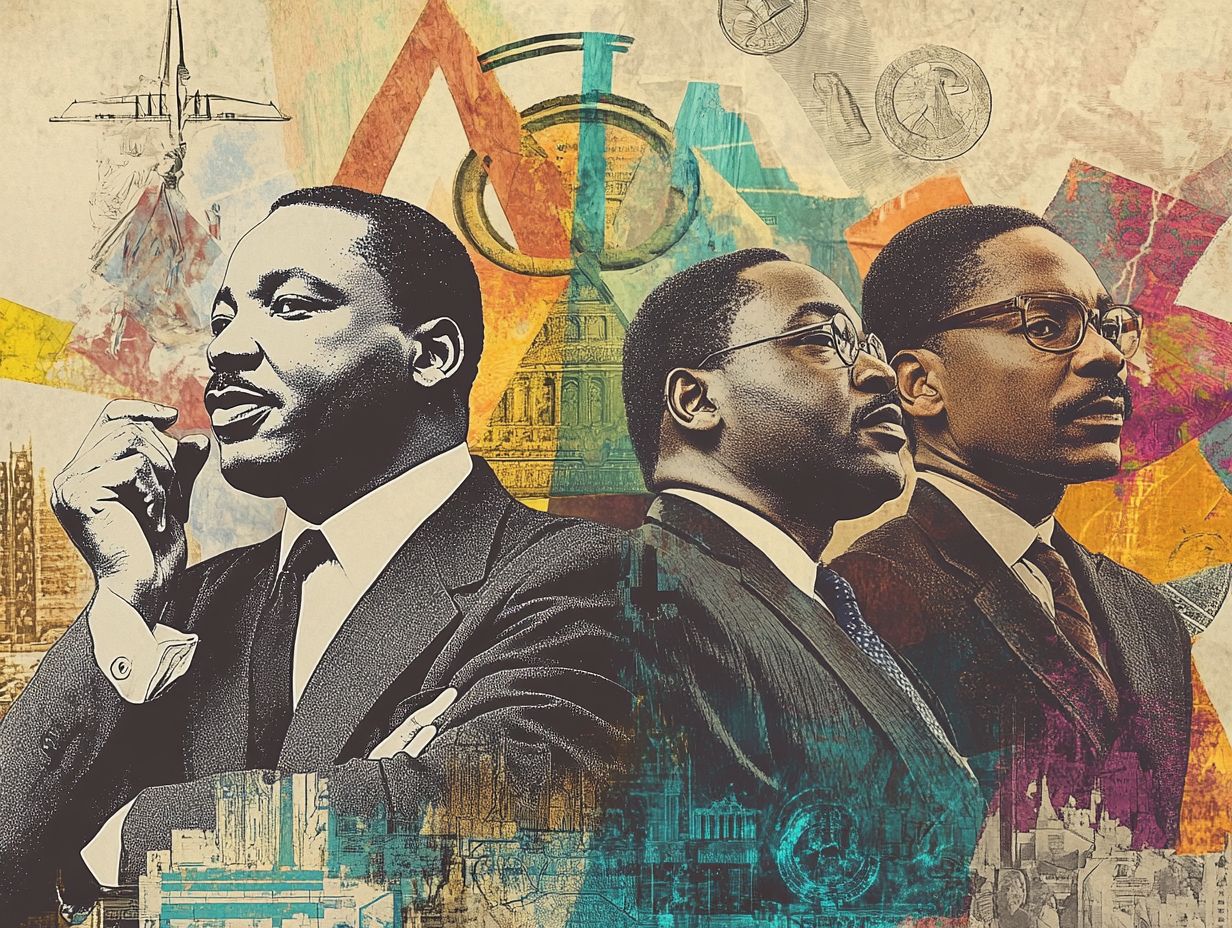
The civil rights movement aimed to achieve critical goals: racial equality and justice for all! The primary objectives focused on abolishing segregation, securing voting rights for African Americans, and dismantling the systemic racism that permeated American society.
Each of these goals was pivotal in reshaping a nation long affected by racial divisions. Achieving racial equality needed both new laws and a major change in how people viewed race. Advocates worked tirelessly to eliminate segregation through targeted legislative efforts, public demonstrations, and strategic partnerships with sympathetic political figures.
Activists vigorously pursued voting rights, a fundamental aspect of democratic participation. Initiatives like Freedom Summer and grassroots organizing, championed by leaders such as John Lewis, highlighted the moral necessity of dismantling systemic racism. These efforts drew national attention to the struggles faced by African Americans in their quest for dignity and justice.
Join the conversation: How do you think the civil rights movement has shaped today s society?
What Were the Main Obstacles Faced by Leaders of the Civil Rights Movement?
Leaders of the civil rights movement faced a multitude of formidable obstacles, including deep-rooted racism, violent opposition from segregationists, and pervasive discrimination. These challenges frequently hindered their activism and placed their lives at risk.
These challenges were not just mere hurdles; they represented deeply entrenched societal norms that infiltrated every aspect of life, from education and employment to housing and voting rights. Legal barriers, such as discriminatory laws and court rulings, consistently undermined their fight for equal rights. Some groups in society resisted, leading to brutal tactics, exposing leaders to threats, violence, and even assassination attempts.
These harsh realities shaped their strategies. They crafted meticulous plans that balanced the urgency of their cause with the safety of their supporters. This dynamic ultimately reinforced their resilience and unwavering commitment to justice.
How Did These Leaders Inspire and Mobilize Their Communities?
Civil rights leaders inspired and mobilized their community through compelling speeches, grassroots initiatives, and the establishment of youth services that engaged the next generation in the quest for social change and racial justice.
Take Martin Luther King Jr., for example. He wielded his eloquence like a masterful conductor, rallying diverse groups and uniting individuals from various backgrounds in pursuit of equality. His iconic “I Have a Dream” speech didn’t just stir the hearts of thousands during the March on Washington; it resonated nationwide, compelling many to join the cause.
Then there’s Rosa Parks. Her courageous act of defiance sparked organized boycotts, amplifying voices against institutional injustices and inspiring countless others to take a stand.
Education played a crucial role in bringing people together. Leaders understood that informed communities were essential for driving meaningful change. Through outreach programs, workshops, and community meetings, they instilled a sense of purpose, giving individuals the power to take actionable steps toward justice.
What Is the Legacy of These Leaders in the Fight for Civil Rights Today?
The legacy of civil rights leaders like Martin Luther King Jr., Rosa Parks, and Malcolm X continues to resonate in the fight for racial justice and equality. Their impact is evident in today s social movements, inspiring new generations of activists to carry the torch for human rights.
Their principles and unwavering determination echo in the current landscape, where people confront systemic racism, advocate for LGBTQ rights, and champion women’s suffrage. These leaders effectively laid the groundwork for contemporary movements, including Black Lives Matter and the quest for marriage equality. Their teachings serve as a moral compass for activists, encouraging a challenge to unjust systems and a steadfast pursuit of equity.
By tapping into the courage and resilience demonstrated by these pioneers, people find motivation and clarity in their ongoing struggle for a more just society. This serves as a powerful reminder that the pursuit of fairness and dignity is an enduring journey, one that requires unwavering commitment. Join the fight for justice today!
Frequently Asked Questions
Here are some common questions about these inspiring leaders.
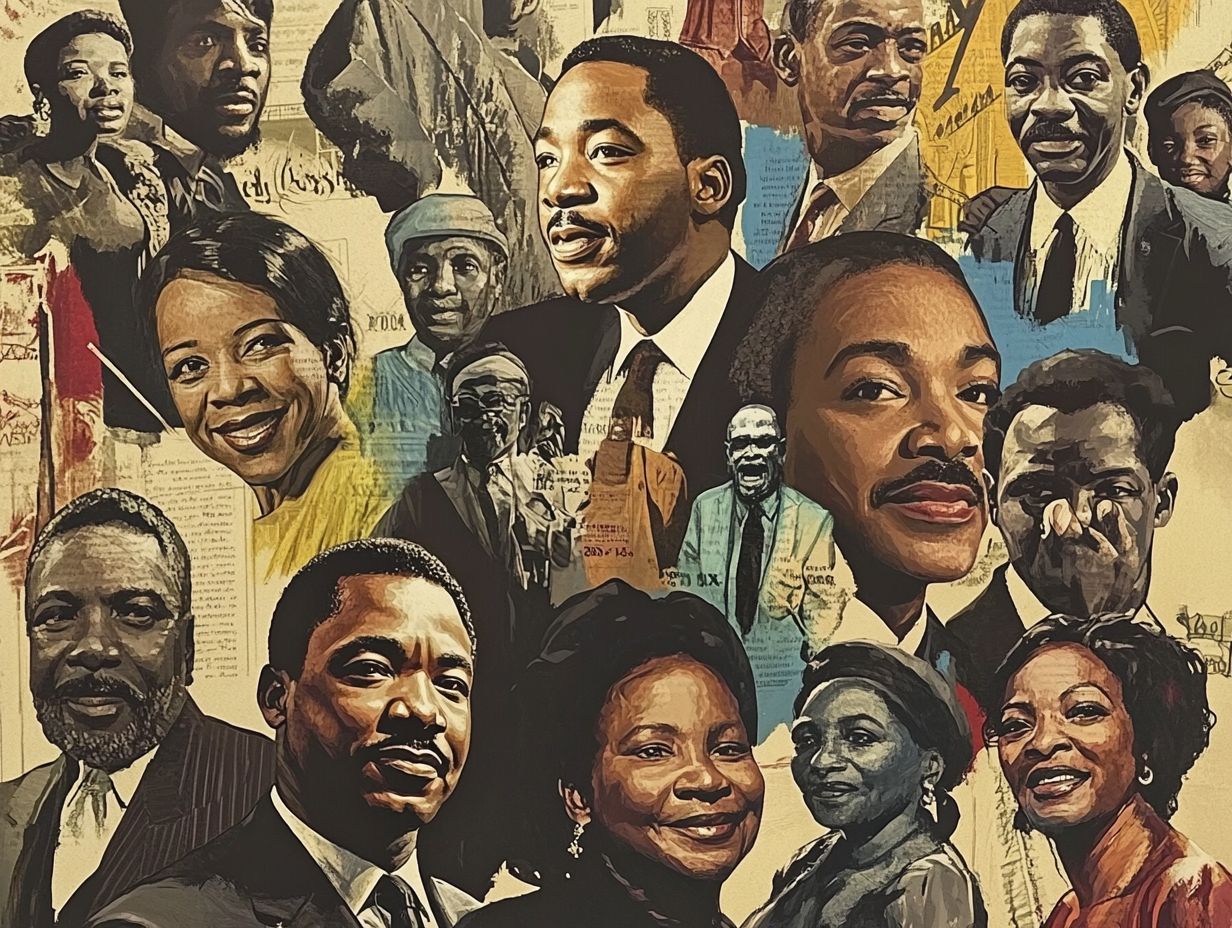
Who were the 5 inspiring leaders of the Civil Rights Movement?
The 5 inspiring leaders of the Civil Rights Movement were Martin Luther King Jr., Rosa Parks, Malcolm X, Thurgood Marshall, and Ella Baker.
What impact did Martin Luther King Jr. have on the Civil Rights Movement?
Martin Luther King Jr. was a key figure in the Civil Rights Movement, known for his powerful speeches and nonviolent protests. He helped to draw attention to the cause and played a significant role in the passing of the Civil Rights Act of 1964.
What role did Rosa Parks play in the Civil Rights Movement?
Rosa Parks is often referred to as the “Mother of the Civil Rights Movement” for her courageous act of refusing to give up her seat on a segregated bus in Montgomery, Alabama. Her actions sparked the Montgomery Bus Boycott and highlighted the issue of racial segregation.
Why is Malcolm X considered an inspiring leader of the Civil Rights Movement?
Malcolm X was a powerful advocate for Black identity and self-defense. He challenged the nonviolent approach of other Civil Rights leaders and highlighted the struggles faced by African Americans, promoting a sense of pride.
How did Thurgood Marshall contribute to the Civil Rights Movement?
Thurgood Marshall was a key civil rights lawyer and the first African American on the Supreme Court. He fought for racial equality through his work with the NAACP, the National Association for the Advancement of Colored People, and was pivotal in the landmark case Brown v. Board of Education.
What was the impact of Ella Baker on the Civil Rights Movement?
Ella Baker was a dynamic force in the Civil Rights Movement. She helped establish the Student Nonviolent Coordinating Committee (SNCC) and played a vital role in organizing the Freedom Rides and other impactful protests.

